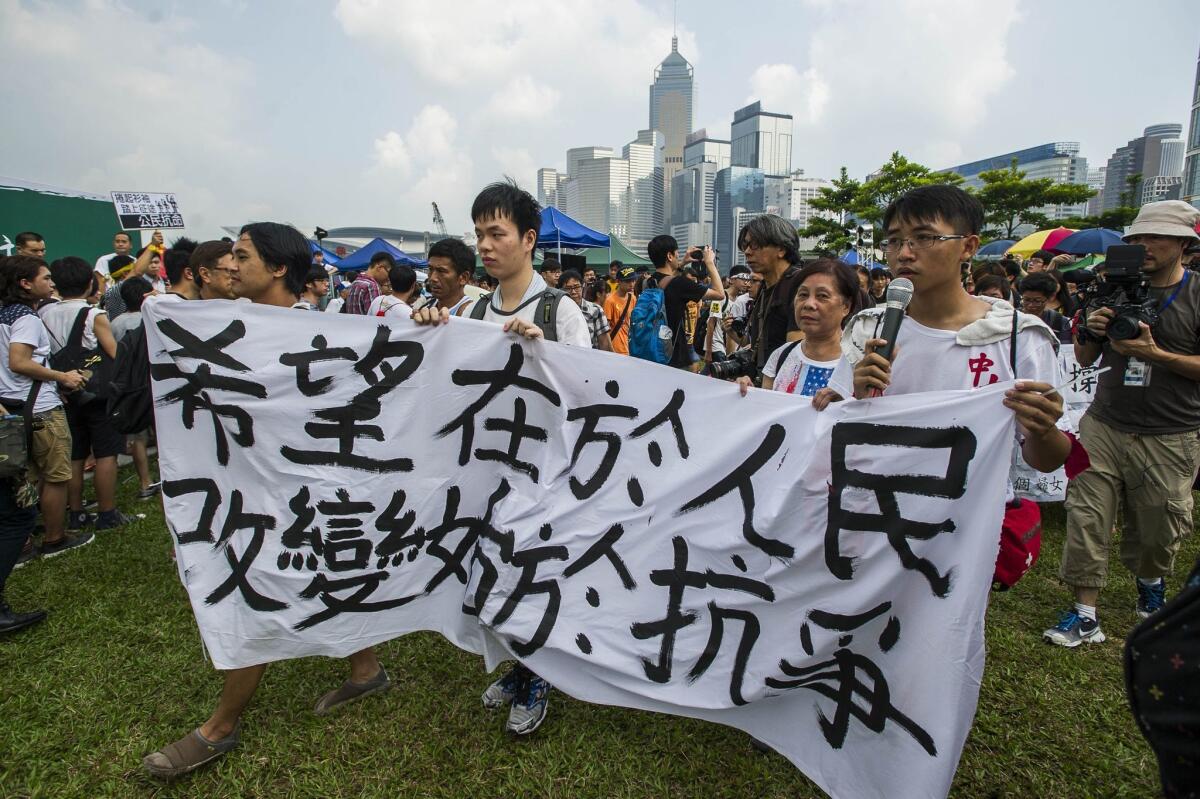Hong Kong students boycott classes to press for democracy

- Share via
Reporting from Beijing — Thousands of Hong Kong college students are boycotting classes this week to press for democratic reforms in the southern Chinese territory.
The protesting students, joined by teachers and members of the public, have turned the Chinese University of Hong Kong’s campus into an ocean of white T-shirts, with many playing guitars and distributing leaflets in the muggy heat. Many are wearing yellow ribbons as a symbol of the democracy movement.
The Hong Kong Federation of Students, the organizer of the protest, said nearly 13,000 students were participating.
Nearly 400 educators and university staff signed a petition in support of the class boycott, the South China Morning Post reported. Leading academics have also stood in solidarity, offering to record lectures and post them online.
The crowds assembled to show their displeasure with Chinese authorities in Beijing, whom activists say are not honoring promises to permit universal suffrage in the former British colony starting in 2017.
In August the Chinese government announced rules for the 2017 election for chief executive, Hong Kong’s highest office, and critics say the guidelines mean only a few Beijing-friendly candidates will be allowed to run for the post. Activists are demanding a fully democratic election with an open nomination process.
In mainland China, state-run media have been ordered to ignore the student boycott and restrict Internet commentary about the strikes.
Instead, media outlets have given coverage to a visit by Hong Kong’s business elite to Beijing this week for a meeting with Chinese President Xi Jinping to discuss the region’s political and economic future.
During the meeting, Xi told more than 60 tycoons and business leaders that the “basic principle and policy” of the current system toward Hong Kong “has not changed and will not change.”
Hong Kong returned to Chinese sovereignty in 1997 and has enjoyed a degree of autonomy from the mainland under the policy of “one country, two systems.” But recent polls have shown most Hong Kongers do not trust either the local or Beijing government.
Results of a survey released by the Chinese University of Hong Kong on Monday showed that nearly one in five Hong Kongers are considering leaving the city for good.
On Tuesday, students gathered in a park across the street from government headquarters. Students rushed toward the offices of Chief Executive Leung Chun-ying and demanded that he address the crowd. They were quickly beaten back by police, and 12 students were detained as Leung retreated inside.
Nearly 500 students then marched from Leung’s office to Central, the city’s main financial district.
The student boycott is widely seen as a precursor to a sit-in by the group Occupy Central with Love and Peace, which says it plans to rally supporters to the central business district Oct. 1. The date is a holiday that marks the beginning of the Communist Party of China’s control of the mainland. The group chose it to lessen potential economic damage to the city.
The group has invited protesters to a “democracy banquet” sit-in, asking them to bring food, drinks, spare phone batteries, sleeping bags and a change of clothes. They have applied for permits for up to 50,000 people, reported Apple Daily, a local newspaper.
Meanwhile, the student group Scholarism has applied for permission to hold a rally outside government headquarters on Friday. One hundred secondary students are expected to boycott class that day, with 1,400 more joining them after classes finish.
“Scholarism will not undertake acts of civil disobedience such as blocking road traffic,” Oscar Lai, a spokesman for the group, told the South China Morning Post.
Silbert is a special correspondent.
More to Read
Sign up for Essential California
The most important California stories and recommendations in your inbox every morning.
You may occasionally receive promotional content from the Los Angeles Times.










